
This review may contain spoilers
"Let's eat together"
Tiger Love was a strange story amalgam of kung fu, Romeo and Juliet, and weird horror. None of the three actually worked although the horror aspect was memorably bizarre.Sher Shin Lan (Hug Chin) and Lin Shao Ho (Lo Lieh) are lovers and on the run because they come from warring clans. Sher's dad and his men have the two trapped on the edge of a cliff. When Shin Lan thinks they've kill Shao Ho she leaps from the cliff and is assumed dead. Now is when the story gets weird. She lands in a tree with a tiger attempting to climb up it to eat her. In fear she pees on the tiger and passes out. The tiger takes her to his cave and cares for her. She thinks it's because if a woman kisses a tiger he becomes her slave. Um, pretty sure she didn't kiss him unless that was edited out, but the kiss is alluded to several times. She has Shao Ho's baby and Uncle Tiger helps her raise him. A young Shao Chang whacks the tiger in the nose with a stick and the tiger leaps at the child with a freeze frame on the child's terrified face. Child Services Line 1!!
Shao Ho grows up and meets his father who is actually alive! He goes to live with him and traps a girl from the Sher family during a hunting expedition and the two fall in love. Papa Sher (Wang Hsieh) will not allow it nor will Papa Lin. The Lin patriarch kicks Shao Chang out. After the Sher heir is mysteriously killed (and stays mysterious to the end of the movie), Shao Chang is blamed and the Shers ambush the Lin family and kill nearly everyone. While looking for Shao Chang, his mother is mortally wounded by the Shers. She begs her son to not seek revenge so that she can rest in peace. He agrees. The tiger, however, doesn't. He kills a man and declares that for 20 years out of love for Shin Lan he hasn't killed a human. In the past, he'd eaten 99 humans and with this 100th kill he will now become a tiger demon! During the day he's a tiger but at night he turns into a green glowing fanged witch with tiger paws for the kill. Vowing vengeance on the Sher family he begins to take them out. Some of the attacks looked frighteningly real. This was no CGI tiger, but the real deal! When the tiger demon disguises himself as the Sher grandma and asks to be let into the house by Shao Chang's love, all I could hear was, "my grandma, what big teeth you have!" going through my head. When the tiger demon states, "Let's eat together," it's not what the young women think their "grandma" means.
The kung fu wasn't great and there wasn't much of it. Stephen Tung would choreograph martial arts for more movies than he would act in and going by this film, that was a good thing. The young romance wasn't very believable. Lo Lieh didn't have many scenes but he could act at least by kung fu standards and was entertaining to watch. Wang Hsieh as the bad clan leader could play the role in his sleep and might have. The editing was choppy at best and the story pacing was awful. For a story with a wide variety of conflicts it could be painstakingly slow during the middle segment. The last 20 minutes with the tiger demon was so amazingly crazy that at least it might keep your attention. The most suspenseful part of the movie was wondering if the actors and stuntmen walked away from the mauling scenes in one piece. The two young lovers were also related, was she his aunt? Or was his mom her aunt? They skimmed over the family connections. Bestiality was implied a couple of times between the mom and the tiger, but I just refused to let my mind go there. Like I said, this was one weird movie.
I'm on a quest to watch as many Lo Lieh films as I can which is why I put myself through this mess. Unless you are in the mood for a poorly made and utterly strange kung fu film, or a kung fu filmdom completionist, my advice is to skip this one.
6/23/23
Was this review helpful to you?

This review may contain spoilers
You killed my father, prepare to die!
Revenge of the Shaolin Kid aka Master of Death was your standard kung fu revenge film except that the hero completed his training before the movie started so that we missed out on the Shaolin training montages. The story didn't try to throw in any curveballs for the viewer, but kept to the straight and simple revenge path. No secret books, no secret lists, just "My name is Li Tian Zhou. You killed my parents. Prepare to die."Chi Kuan Chun's Li spent eighteen years training at a Shaolin temple until he was ready to avenge his parents' murders. He had to fight his way through numerous baddies before ultimately taking on Lo Lieh's Big Bad Kim. Near the end of the movie he stupidly believed Chiang Tao when he told him that Lo was not the bad guy, that Chen Sing was. Dude, you never believe Chiang Tao, he's always a henchman for the Big Bad. Chen Sing playing against type was the good-hearted doctor who laid his sword down years ago. Somehow Chen ended up fighting and kept his shirt on.
The fights were slightly above average for Taiwanese kung fu films from the time, not super-fast, but not kung fu posing either. Lo Lieh had a spinning dagger which didn't do much although it made a funny noise and was distracting. Chi Kuan Chun had one facial expression but he was easy on the eyes and moved fluidly. Chia Ling and Wu Ma livened up the movie during their cameos in a casino brawl scene. Lo and Chen were always fun to watch regardless of what else was going on in the movie. Chi's cocky stoicism began to wear thin by the end especially due to an idiotic decision his character Li made regarding Chen's character. I almost started rooting for Lo's despicable character or at least a deadly draw in the final fight.
Due to its linear nature, Revenge of the Shaolin Kid avoided the convoluted storyline holes so many kung fu films fell into which worked to its favor. The need for revenge against several people provided ample opportunities for fights, the sole purpose of old kung fu flicks. There were enough charismatic cameos to help gloss over Chi's one note performance. Not a great film, but not a bad one either, just slightly below average for the genre. As always, I rate these old niche movies on a curve.
6/19/23
Was this review helpful to you?

This review may contain spoilers
"It's a trap!"
Hansan: Rising Dragon is a prequel of sorts to Admiral: Roaring Currents, with the events taking place five years earlier. The battle we are told was a war of the righteous against the unrighteous as Hideyoshi of Japan sought to put both Joseon and China under his heel. To protect his country, the shrewd and stoic Admiral Yi Sun Sin took on the ambitious and cocky General Wakisaka in a deadly game of oceanic chicken.The film begins with Joseon having suffered several humiliating defeats. In a battle of spying and strategizing, both sides seek to gain the upper hand for the inevitable sea battle. Yi's ship designer has developed plans for a new and improved turtle ship which the Japanese promptly steal. The first three quarters of the film deal with spying, coordinating or killing allies, and preparing for the fights for survival on land and sea.
Having watched Admiral: Roaring Currents I was underwhelmed with this film. It was lacking in the same tension and energy. Much of the first half of the film bounced around so much that it was hard to keep up, much less emotionally connect with any of the characters. I was surprised to discover the same man directed both. I suppose the difference was that The Admiral had a different screenwriter. The pacing and character development were noticeably lacking in comparison to the previous film.
Overall, the acting was serviceable. Park Hae Il played Yi so stoically that the famous admiral seemed devoid of any personality. He held the same expression throughout the film regardless of what was going on around him. The only character who drew me in was a samurai who pledged his allegiance to the great Joseon admiral. Kim Sung Gyu gave a compelling performance as the double agent who chose to fight on the side of righteousness. The bloated cast had many a familiar face if you could make them out behind the beards.
The water battles and CGI were spectacular giving you the claustrophobic experience inside a ship all while showing the full scope of battleships with their canons firing and splintering the opposing ships. The water sequences worked well with the varying currents as did the fog and wind elements. The land skirmishes lacked any weight to them and seemed very small scale in comparison to the sea battles.
The final fourth of the film was engaging as Admiral Yi showed why navies around the world have studied him even centuries later. Outnumbered and outgunned he outfoxed Wakisaka in a game of Crane Wing vs Fish Scale. This was a man you did not want to play chicken with, especially when death was on the line. I only wish the first three-fourths of the film had been remotely as captivating as the final showdown.
6/10/23
Was this review helpful to you?
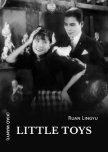
This review may contain spoilers
"They have the strength, the brains, and the will to struggle!"
Little Toys not only told the tale of a passionate and talented young toymaker, but also used the toys she made as an analogy for the war creeping up on her doorstep. The movie was decidedly propagandistic and no wonder with the strain of civil wars being fought at home and a foreign army invading as well. Like many in their situation, movies were not only entertainment, but at times catharsis and a call to arms.Ruan Ling Yu played Sister Ye/Xiu Xiu, a toymaker extraordinaire in an idyllic rural village, whose business kept many people fed. Married to a slovenly, but kind husband, she had two children to care for as well. A handsome engineering student in town fell hard for her, but she refused to run away with him. Always seeing the big picture, she challenged him to finish his degree overseas and return to China to improve their country's industry and help lift the poor out of poverty. Emboldened by her patriotic words he set off to do his duty.
The movie begins with numerous comedic moments, but this is a Ruan Ling Yu film so don't fall for it. She once again played the avatar for the suffering women of China, if not China herself. Despite being loyal and patriotic, not the flawed fallen women she often played, she still met with endless suffering. Along the way she dealt with the death of loved ones, the disappearance of a loved one, civil war, becoming a refugee, competing with cheap foreign goods, the Japanese invasion and the infamous January 28th incident, as well as debilitating PTSD. That was a lot of tragedy to work into one film.
At the time, China was dealing with class issues as well as political ineffectiveness and corruption. To avoid censorship, the name of the invading army was never mentioned. You didn't have to be a history major then or now to know who it was. While some of the speeches meant to inspire felt organic to the scene, some of the leftist and nationalistic speeches could be stilted and rather awkwardly wedged into conversations.
What I found interesting was the use of toys as a metaphor for the soldiers, playthings moved about during war. Scenes of toy guns, tanks, and planes were overlaid with battle scenes. Many of the weapons, planes, and tanks used in the battles resembled the toys previously shown giving the scenes a surreal feeling as toys gave way to deadly reality. Even at the end of the film, Xiu Xiu confused her toys with real soldiers and weapons, calling them to fight.
Ruan Ling Yu gave a nuanced performance exhibiting numerous emotions from gentle caring mother to a woman broken by war and tragedy. She truly was a gifted actress taken from the world too soon. Li Lili, another famous silent film actress, portrayed Xiu Xiu's teenaged daughter. Though not as subtle she also gave an impassioned and at times light-hearted performance.
While Ruan was captivating, wringing as much emotion as she could from each scene, the film felt overly long and disjointed at times. Because it covered so much ground and often glanced quickly over tragedies, I found it difficult to connect emotionally with the large cast. The film felt more important as a historical piece than as a piece of entertainment. When Ruan pierced the crowd around her with a steely gaze at the end of the film and shamed them, declaring they needed to fight for their country's survival and then stared directly into the camera challenging the audience, it crossed over from being a popcorn movie and into a call to arms. There has always been a place for these kinds of propagandistic movies, especially during times of desperate national crisis, it's just best to know what you are going into with this film as it could be heavy-handed at times. To be sure, regardless of your feelings about the subject matter, the film is worthwhile viewing if only to watch one of the few surviving Ruan Ling Yu films.
6/5/23
Was this review helpful to you?

This review may contain spoilers
Three vivacious boys and the mountain they live on
Hang in There, Kids! was written and directed by Taiwan's first female indigenous director, Laha Mebow. The film features three mischievous boys who live on a picturesque mountain and are about to graduate from the 6th grade. Though they go about their days in a joyful, care-free manner, their smiles hide very real pain.Watan who is an orphan living with his grandmother is the de facto leader of the group. He is overjoyed that his high school dropout brother has returned from Taipei to help with his grandmother's farm. Watan also harbors a not-so-secret crush on his afterschool teacher, Lawa, who is confined to a wheelchair. Chen Hao lives with his aging single father and longs for his absentee mother. The last of the group and the shortest is Lin Shan who wants to be an NBA player like Jeremy Lin. His father drinks too much and belongs to a band that struggles to find gigs in Taipei.
Whether pinching Watan's grandmother's veggies or Chen Hao's dad's peaches to sell illegally on the road or running away to spend the night with a French couple on the mountain, the boys always find joy in the moment. Despite their troubles they look for fun and adventure wherever they are. A fieldtrip to Taipei with their class gives each of them a chance to discover or share something important.
Music is woven throughout the film whether it is a naughty ditty the boys sing, a father's heartfelt apology and love for his son, or a woman's song of love and life after a crushed dream. The songs are skillfully used to not only enhance the emotions in a scene but also to tell part of the story.
The three boys carry the weight of the film on their small shoulders as the conflicts in this slice of life film are minimal. Watan's brother becomes involved with marijuana growers looking for land, Granny needs new teeth, and there's the small meaningful disclosure of the teacher's former life, but it's not like there are huge plot revelations. Most of the film is played out through the boys' daily lives and their search for a mother, a father, or a gift of love to a teacher. The boys' natural and energetic performances brought to gentle life the telling of their stories. If ever there was a setting that could be billed as a co-star it would be the scenic, mysterious mountain the boys traverse during their adventures.
There was a peaceful mood to this film. Even with the familial problems, the boys were close and tactile with each other and the other adults in the film. Lawa may have been in a wheelchair, but her heart soared to the children she cared for and the mountain around them. A sense of community and pride defined the story and the Sqoyaw people within it. Hang in There, Kids! was 90 minutes of friendship, family, and a little heartache. The mountain had its dark side but there was always something to discover. "What do you know? Maybe great things will happen." This tranquil, touching film about childhood is one to try if you enjoy this genre.
5/26/23
Was this review helpful to you?
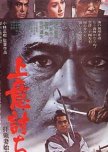
This review may contain spoilers
"Each must live his own life"
In Samurai Rebellion, there was a rebellion, but not of swords and muskets, a rebellion against the rigid samurai code that the local lord had subrogated with tyrannical orders levied according to his whims. Three people stood up for the injustice done to them in the name of order and tore down the societal walls suffocating them in order to be individuals with their own wills and to fight for their basic human rights no matter the cost.The film begins with samurais Sasahara Isaburo (Mifune Toshiro) and his buddy Tatewaki (Nakadai Tatsuya) grumbling about how boring their lives are in the equivalent of middle management jobs for the local lord. Isaburo is in charge of cleaning and counting the weapons in the local artillery while Tatewaki is a glorified gate guard. Isaburo has been stranded in a loveless marriage for 20 years to a harridan who rules the household with a sharpened steel tongue while he plays along to keep the peace. Upon arriving home, he receives orders from the lord that his oldest son, Yogoro, is to marry the lord's dismissed concubine. Lady Ichi was rumored to have gone wild when she saw the lord with another woman even striking him and tearing at his clothes. Isaburo seeks a way out for his son, not wanting to relegate him to the same marital hell he's lived in. Yogoro realizes the penalty for refusing and acquiesces. In a turn of good luck, Ichi is actually the perfect wife and she and Yogoro fall in love and have a daughter, Tomi. When questioned about her behavior with the lord, it turned out that the lord had given her no choice and forced her to be his concubine even though she was engaged and 30 years younger than he was. Their marital bed was torment for Ichi, "like dragging a pure silk kimono through the mud".
Isaburo retires and makes Yogoro the head of the household. Just as everything is going well, the lord's son dies leaving only Ichi's son she had to leave behind as an heir. The heir's mother could not be married to a vassal so she was ordered to return to the castle. Isaburo had gone along with his wife and lord in everything they'd ever asked no matter how degrading. Seeing his son and daughter-in-law having the kind of love he'd never experienced lit a fire in the retired samurai. Breaking up a loving family at the lord's capricious notion was cruel and barbaric and one too many slashes against the family's honor. Though there were family councils and political councils held advising them to comply, the three stayed strong in refusing until Ichi was kidnapped and returned to the lord. At this point, Isaburo and Yogoro knew the score. The lord's actions would be frowned upon by other daimyos and the shogunate if discovered but getting the information to Edo would be perilous. The lord's men approached Tatewaki and asked him to kill Isaburo, knowing he was the only man who stood a chance against him. Tatewaki told them to negotiate or there would be a mountain of dead men.
The gun on the mantel at the beginning of the film was the lord stating that Isaburo and Tatewaki would never fight because it would hurt the family of whoever lost. You know before the final credits, the two will battle. And by the time the fight against the lord's men begins you will also be blood thirsty for the mountain of dead men after all of the sorrow and suffering.
Tsukasa Yoko as the Lady Ichi was the emotional glue holding the story together as she finally found a safe and loving place to call home and also had to show determination in the face of insidious threats. Mifune Toshiro gave one of his best performances. Initially, he was the henpecked husband with little to live for and slowly gained the fire and fierce attitude we are used to seeing in his samurai characters. Not only true love, but human honor beyond the samurai code was worth fighting for. As he determined to break the rules, he was seen walking on the carefully raked sand in the courtyard instead of on the path. The symmetrical and even lines in the house were purposely carved and nailed askew in defiance of the classic norms. Isaburo also gained a self-confidence beyond his skill with a sword. "For the first time in my life I feel alive!"
Samurai Rebellion blended low key romance, family drama, and political drama in a battle against corruption and a rigid, unyielding system that demanded complete obedience even in the face of abuse and cruelty. There was no cathartic ending, the three main characters were aware where their fate lie and embraced it. They knew the consequences for their act of rebellion for themselves and their families, they simply could no longer tolerate being treated as inhuman. This film was a story of love and the need for dignity which also happened to also be a samurai film. Well worth seeking out if you like old films or Mifune Toshiro.
5/15/23
Was this review helpful to you?

This review may contain spoilers
Uneven romantic comedy
Wild Rose was a romantic comedy highly influenced by Japan's invasion of the country. The understandable propaganda due to the crisis, juxtaposed to the comedy could come across as a strange combination.Wang Ren Mei made a delightful Wild Rose. Living in a small village with her father, Xiao Feng was vivacious and always with a smile on her face. Jiang Bo/Po, an artist from a wealthy family drives his fancy car into town and while painting pictures of the rural landscape becomes smitten with the wild girl. About this time Xiao Feng's father fights with a creepy old creditor who wants to buy Xiao Feng to square his accounts. Her father accidentally kills the man as the hut catches on fire. When he escapes and runs away it leaves Xiao Feng to believe he is dead. Jiang takes the newly orphaned Xiao Feng back to the city with him. He gives her a makeover before taking her home so that his father will accept her. After she commits a faux pas the father orders her out and Jiang went with her.
The coddled Jiang was introduced to how the other 99% live. With two low income friends they found a place to live already housing ten families run by a cranky landlady. Without his father's influence and connections, Jiang was unable to sell his paintings and turned to painting billboards. At first everyone was smiles and holding hands and then the unforgiving winter set in and the more unforgiving landlady. Playing housekeeping in poverty turned out to be a hardship with life and death on the line. Xiao Feng picked up a wallet dropped by a drunk but was chased by the police. Jiang and one of their friends take responsibility and are thrown in jail. Xiao Feng goes to Jiang's father, accepts full responsibility for his son's actions and promises to never see him again if he will save his son. Jiang's father agrees. Afterwards, Jiang and the boys search relentlessly for Xiao. In the end, when the movie takes a 90 degree turn, as support for the volunteer army is being drummed up, Jiang once again leaves home, this time for his country. In the recruiting parade are his old buddies and Xiao Feng. Even war can facilitate romance!
The print I watched was in bad shape with many scenes too dark to make out or cut off mid-frame. The acting overall was good, some better than others. This version had no music accompanying it.
Though it felt like we were supposed to side sympathetically, maybe even politically with the Wild Rose and eschew the filthy rich who focused on keeping the classes divided, the scenes involving the wealthy seemed lovingly luxurious. Only at the end when Jiang stepped away to pay attention to the volunteer parade did the oblivious dancing stop. The aristocrats seemed completely out of touch with what was going on in the streets. The military scenes and even the song and military inspection Xiao Feng performs with the children in her village could be jarring. "To love China is to love your mama!" Given their country was under attack it seemed reasonable to appeal patriotically to the audience even if it caused the movie to shift out of balance at times and could be heavy handed.
Wild Rose had some charming and inspiring moments interspersed, but overall felt uneven emotionally and narratively. As challenging as the degraded film could be to watch, most likely this is a film for silent film buffs or those who are fans of the director and/or cast.
5/11/23
Was this review helpful to you?
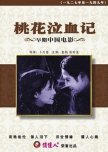
This review may contain spoilers
"Like teardrops, the petals from the peach tree fall..."
The Peach Girl was a tragic tale of forbidden love between the classes. Ruan Ling Yu and Jin Yan made for a beautiful and tormented couple in this classic silent film.Miss Lim (Ruan) and her parents worked on a large property. When Lim was a baby her mother planted a peach tree saying it was a symbol of her child's life. If the little girl was good it would blossom. Lim and the owner's son, Teh En, became friends despite his mother's disapproval. Even at the tender age of five, love blossomed along with the peach tree. Teh En moved away, later returning as a young man. He and Lim reconnected and their love continued. His mother still did not approve. Teh set Lim up in an apartment and told her his mother was going to let them marry. This was a bold-faced lie because his mother was arranging another marriage for him. When Lim's father found out what was going on and that Lim was pregnant, he confronted Teh En's mother who offered to pay them off. Insulted, Lim's father refused the money and was fired for his efforts.
"A man's life might be easily altered by circumstances." Teh En begs his mother to let him marry Lim and she responds by locking him up in their mansion. This was more in mind than physically because she was half his size and constantly shaking from her opium addiction. He could have easily pushed past her at any time. Teh's mom is worried about their "social dignity" more so than their familial integrity. Teh believes that "wealth or poverty does not come between love" but in real life that isn't always true, especially when descending from wealth into poverty and for a man who never worked a day in his life.
While Teh's mom tries setting him up with other girls Lim has their daughter. By this time Lim's mother has died and her father has been blinded. Melodrama thy name is Peach Girl. Lim's landlady attempts to pimp her out to an old man but upon seeing the peach blossoms she determines to stay strong.
"Sickness invariably visits the poor and helpless" especially in a Chinese silent films. Lim lays dying and Teh finally gains enough courage to push past his overly dramatic mother to run and stumble and run and stumble and run and stumble to the woman he loves. With Lim's last breath Teh promises to live to take care of their child and stand up to his mother.
The intertitles were beautifully decorated and had dialogue in English and Mandarin. In the version I saw there were also simpler English translations beneath for some intertitles. The print I watched had no music. I've read that silentfilm.org has added music on a DVD they released. By this time in Hollywood most movies, with the exception of Charlie Chaplin movies, had sound. Possibly due to access issues, lack of theatrical infrastructure, and Japan invading Manchuria in 1931, the Chinese were slower to add sound. Many frames were badly faded but did not take away from my experience.
Ruan Ling Yu's expressive face and the timeless story adapted well to silent film making the story easy to follow. This was not the best performance I've seen by Ling Yu, at times it was hampered by the thick white theatrical makeup. Without the gift of spoken words, she still conveyed a wide range of emotion brilliantly emoted through her facial expressions and body language.
Peach Girl's story at this time in history feels overly familiar, but in 1931 might have felt fresher. Perhaps due to the hard times, the plight of an abandoned woman often left with a child and living in poverty was a common theme in many of the surviving silent films I've watched. More often than not the woman was criticized by society but not the filmmaker as the film called out for audience sympathy. In this film, the director and writer highlighted the discriminatory gap between the classes. "Class distinction does not exist among children." The lesson was nearly always learned after a high price was paid.
The Peach Girl was entertaining and worth checking out if you enjoy older films and Ruan Ling Yu's performances. The alternate title, Peach Blossom Weeps Tears of Blood might have been more accurate for this film. "Observe how teardrops are petals of the peach tree…the peach tree speaks of love, of sorrow, and of tears."
5/11/23
Was this review helpful to you?

This review may contain spoilers
"It's only human to pretend nothing is wrong"
Director Naruse Mikio dissected a lifeless marriage without really digging into the reasons for the spouses' lack of fulfillment. Both lamented internally that they had no idea what their spouse was thinking and neither had the courage to ask. They were living in a Groundhog Day where every day was exactly the same and neither knew how to break out of the cycle of misery.Toichi is a salaryman who never moves up and doesn't seem particularly interested in further success. In order to make ends meet, he and his wife rent out rooms in their house to an array of eclectic tenants. His wife, Mihoko, also sews/knits to earn extra money. While Toichi doesn't care whether the tenants pay their rent on time Mihoko is more practical. They bring in enough money for the basics but don't seem to ever leave their small living area. Married for ten years, they have no children and apparently no disposable money for attending movies, plays, concerts, or even going to restaurants. Mihoko's world resides in their cramped living quarters. Only the gossip from the artist who lives across the hall and the feuding couple upstairs brings any entertainment into her life. For Toichi and Mihoko, they have nothing to divert themselves or share together, they have only each other and neither has made the effort to reach the other emotionally.
Toichi is approached by Sagara, a young secretary in his office, to attend an art gallery. They have coffee and spend time together before she returns to Osaka to live with her family. On a business trip to Osaka with his boss, Toichi seeks out Sagara only to find she has a young son. They end up spending the night at an inn. Sagara is not only drawn to Toichi's looks but also the security he could bring. Whether Toichi was really in love with her or in love with the idea of a different life lived was difficult to tell. Mohoko was aware he was seeing Sagara and puts her foot down. Even his father-in-law visits him to discover his intentions. Whether Toichi would divorce his wife or simply have Sagara as a mistress was never revealed.
The film did show women either working or seeking a way to make a living on their own. One of the tenants supported her unemployed husband and mother-in-law by working as a bar hostess. Sagara intended to open a dress shop with a friend partly funded by an uncle. Mohoko could not fathom a way to be financially independent and at her age she would be unlikely to find a new mate. While much was brought up about women becoming independent by opening a shop, that move requires capital and a lot of luck. Perhaps that type of endeavor was too risky for Mohoko who would be left without a safety net.
Toichi held the power in the relationship. Men still dominated the workforce at the time and Toichi could always find a younger wife. Female characters constantly rhapsodized what a fine catch he was. It was also brought up that Mohoko wasn't a very good cook, didn't apply her makeup correctly, was old-fashioned, and too cranky. Her husband must be involved with someone else because she wasn't a good enough wife. Toichi worked, ate, and went to bed, scarcely acknowledging his wife's existence and leaving much of the job of being a landlord up to her. Despite the fact that he was in the wrong having an affair, with Mohoko clearly in distress, at no time did he ever show a modicum of sympathy or concern for her. In matters of the heart and in financial matters, he rarely displayed any valor. And while much was made about male pride, Mohoko asked what about her female pride and why did everyone want her to apologize and turn a blind eye to Toichi's affair.
Naruse didn't seem to take sides in this cynical view of marriage though attitudes toward Mohoko certainly reflected the times. Of the three marriages shown, one ended in divorce, and another one in suicide. Toichi cheerfully imagined that they could both have fresh starts with a divorce. Mohoko felt trapped, knowing her husband no longer loved her and that she no longer trusted him, but unable to move on alone with no financial security. Even with divorce becoming more acceptable there were societal norms that she was unwilling to step outside of which would relegate her to a loveless marriage.
By the close of the film, Toichi and Mohoko were inhabiting a silent world, going through the motions, miserable but unable to find any hope for a better life. " Wife" ended where it began, only in a worse version of a day repeating itself with the people involved still unaware and unable to remedy their unhappy situation. Though there were moments of comedy supplied by supporting characters, the film was a dark, bleak look at married life with few sympathetic characters.
5/8/23
Was this review helpful to you?

This review may contain spoilers
So bad, it's just bad
Some movies are so bad that they are good. The Invisible Terrorist almost made the cut in this category if not for two disturbing scenes that downgraded it in my view. Too bad, I'm always up for some Carter Wong kung fu action and ridiculous weaponry and plot lines. The Invisible Terrorist delivered in those areas.Once again, Ming rebels have a secret list of their members that for some reason they are carrying around and the evil Qing, of course, want to steal it. Poor Lo Lieh, in what amounts to a guest role, is taken out by a Qing ambush within the first ten minutes of the movie. Wang Hsieh is a turncoat Ming general working for the other side along with Chin Kang and Lung Fei. A Shaolin monk who is a rebel leader gives Carter Wong the secret rebel list. The monk tells him that there is a traitor among them called the Deadly Blade. During an attack, the monk is killed as the rebels escape. Carter divides the list between himself and Cliff Lok and Wen Chiang Long. From there the story amps up the bizarro plot lines.
What ruined this film for me is when Carter's character is captured and his sister is brought in to persuade him to give the Qing the list he has hidden, he brutally rapes his sister to prove that she isn't his sister. The only thing that it proved to me was that he was a vicious pervert. Even plot-wise it didn't make sense as they were alone in a prison cell and he was rescued about two minutes after the fact. Later, a number of pigeons were killed. So, if incestual rape and animal cruelty trouble you, I would recommend you not watch this movie.
It really was a shame because this movie has one of the most bonkers plotlines I've seen in a kung fu film, not good, but so bad it was funny. The number of double crosses and "I know something you don't know!" reveals kept going right up to the end credits. In an ode to school band members, one of the deadly squads of assassins was called The Six Cymbals. They were impervious to swords and defeated their opponents with the loudest most annoying weapons ever. Another squad was called The Six Whips. They too, had loud annoying weapons impervious to swords. But they had a weakness---bamboo!
Loud annoying weapons, rape, animal cruelty, the makers of this movie knew how to ruin a perfectly convoluted kung fu good time. My advice is to skip this one. I wish I had.
5/5/23
Was this review helpful to you?
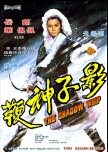
This review may contain spoilers
"We'll have to fight our way out!"
Cheng Pei Pei was one of Shaw Brothers big female stars after the success of Come Drink with Me. This time instead of a sword she wielded a deadly whip in the snow for The Shadow Whip. While the film didn't break any new ground or have memorable fight choreography it was fun and stocked with plenty of familiar faces for kung fu fans.Shadow Whip opened with stunning mountain scenery shot in the snow. It was a rare departure for SB using this kind of outdoor scenery for a big part of a movie. Pei Pei played, Miss Yun, the "niece" of a secluded inn keeper who would turn out to be the infamous Shadow Whip, Fang Cheng Tian played by Tien Feng. Ku Feng as Chief Hong, Wang Hsieh as the leader of the Serial Trio, and Yueh Hua as the earnest Wang Jian Xin all collide with Miss Yun and her comic sidekick Er (Li Kun) violently at a local inn. Later Chief Hong, the man who cast no footprints in the snow, would show up at the isolated inn owned by Miss Yun's uncle. At this point everyone believes that her "uncle" is the legendary Shadow Whip who stole 300,000 taels worth of jewelry 15 years ago, killing a respected official's family in the process. Wang's uncle had been the head of the escort service for the transport who was ruined after the theft and murders. Hong and Wang are out for revenge and a plethora of others are on the hunt for the Shadow Whip in order to steal the stolen jewels.
Miss Yun comes home at one point to find people murdered and she is surrounded by bandits led by Kao Ming. "Are you officials?" "We're the bandits of Yan Yun. I trust Fang Cheng Tian has mentioned us." She did not look frightened, more like, 'Only 16? You should have brought more men'. Her uncle showed up and the two of them made short work of the bandits with their powerful and lightning-fast whips. Later that night she takes a message to Wang and they are surrounded at the inn by what looks like all the men in the region. "We'll have to fight our way out!" It's a martial arts movie, we'd expect nothing less. Chief Hong becomes determined to kill Miss Yun when he discovers her real family name is Yang. Mmm… let's see… it's Ku Feng with a maniacal evil laugh, he's hanging out with Wang Hsieh, and keeps trying to kill the heroine. Even with Tien Feng playing the Shadow Whip it doesn't take much to connect the dots to see who the real bad guy is.
The fights were mostly with swords and the aforementioned whips. The whips were used creatively to cause much bodily harm even if it wasn't always logical or physically possible. Swords, spears, and bodies were propelled with deadly and dismembering results! The sword-fights were slightly above average for the era. And 30 years before Crouching Tiger, Hidden Dragon, this film had a flying battle in the trees. Being a wuxia, there was quite a bit of light body flying. Despite having decent sets, you could see the wires in several scenes. Pei Pei is one of my favorite action heroines. She battles fiercely and doesn't look out of place with a weapon in her hand. Even better, she was allowed to take vengeance on her enemy instead of leaving it up to the men.
The snowy scenes were beautiful and nicely highlighted the bloody battles played out on the glittering ground. Horses were ridden through the deep snow up and down the mountains and in the forests. During one scene it was nice that the snow plow from ye olden times must have cleared off the road for the horses though it would have been nice if they'd covered the tire tracks.
Yueh Hua was less stiff than usual and quite energetic in his fights. Pei Pei was gorgeous, fluid and agile in her movements, always a delight to watch. Tien Feng, normally cast as a baddie made a sympathetic whip fighter. And I'm always happy to see Ku Feng who seemed to be having a good time with this role.
The Shadow Whip wasn't a great martial arts film but the fights and plots twists were fun and Pei Pei brought her A game as always. I grade old niche movies on a curve. This film was about average but I gave it an extra bump for the spectacular scenery and a proper ending. No frozen frame as the killing blow was landed!
4/27/23
Was this review helpful to you?
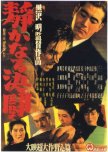
This review may contain spoilers
"Misfortune makes people stubborn"
The Quiet Duel was the second collaboration of Kurosawa Akira and Mifune Toshiro. The story was told from a field hospital during WWII and then in a small clinic for the poor right after the war. Due to the immediacy of the filming so close to the war the characters' struggles felt authentic. A young Mifune gave one of his most restrained performances as a doctor suffering in silence, refusing to give into desire or despair and living out his conscience dispensing hope to those who had less than he did.Mifune's character, Dr. Fujisaki Kyoji, performs surgery on a man in a ramshackle field hospital low on supplies. During the surgery he accidentally cuts his finger and he continues on for another hour. Kyoji discovers that the patient has syphilis, contracted from his promiscuous lifestyle. The doctor contracted syphilis but had nothing to treat it with until he was sent home much later. The treatment would take 3-5 years, maybe longer. Knowing the stigma of being considered dirty with the disease the pure in heart doctor broke off his engagement with his fiancé. Minegishi, a probationary nurse at his clinic, was snide to him when she saw him treating himself with Salvarsan. Suffering her own shame from being a pregnant, single mother, she came to take his side when she heard the reason for his suffering. Into Kyoji's personal duel of desire and conscience walked Nakata, the man he'd contracted the disease from. Nakata had refused to seek treatment and had also married and impregnated his wife. Kyoji sought to help the couple only to find Nakata as reckless with his wife's health as he was with his own.
Mifune Toshiro had to portray the doctor's silent struggle to deny the desire of his heart and his body, to kill that desire with his conscience and commitment to being a doctor. His stethoscope became his armor against his desire for the woman he loved. He was torn for he had done nothing to deserve being kept from her, so why must he suffer? Minegishi made the correlation that some patients screamed when they were in pain, others dealt with their pain quietly, dripping in sweat. Mifune did an admirable job of portraying the selfless man writhing quietly in pain, refusing to retreat from helping others.
Sanjo Miki's Minegishi had the most character growth of anyone in the film. She went from an annoying, self-pitying probationary nurse to maturing into a caring person and mother. Initially she was one who would have been screaming in pain but learned to focus her attention on becoming a better woman and nurse biding her time for the doctor she had come to love.
As a modern viewer, I did question the good doctor performing surgery. Just as he had contracted the disease from a surgical accident, couldn't a patient be at risk as well? I suppose the poor people who came to see him unable to pay had few other choices.
Kurosawa kept the framing tight, never leaving his tormented doctor's face too far from sight. He was careful to make the distinction between Kyoji, an innocent contracting the disease and Nakata, a sexual scoundrel. Of course, there are many shades of gray with this medical issue, but in 1949 he was not going to explore those.
Despite the melodrama and heartbreak, the movie did end on a hopeful note. Kyoji and Minegishi learned to walk with their chins up and face their problems head on, teaching their patients to do the same thing. They might have to suffer as well, but where there are clouds the sun is also present if you can reach high enough.
4/25/23
Was this review helpful to you?

This review may contain spoilers
Where everybody knows ye olden name
Isekai Izakaya Nobu was a sweet drama featuring a wide variety of Japanese bar foods. It was very similar to the Shinya Shokudo series if the chef had been serving patrons from a medieval world with two moons that never waxed or waned differently.The classically handsome Otani Ryohei as Chef Yazawa and his Girl Friday, Takeda Rena as Senke Shinobu opened Nobu and discovered their door led to an alternate world named Aitelia, where apparently the only thing the locals had to eat was wurst and potatoes. There was a small effort to insert some German words in the first episode, and all of the characters had Germanic or English names. Everyone was badly dressed like they were going to a medieval fair, complete with blonde or red wigs.
The locals were dutifully dazzled by things like clean drinking water, beer on tap, glass mugs, and a chef's knife. More so, they yelled and screamed and emoted with every bite of flavorsome food that was offered to them. I suppose if your entire diet consisted of the same boiled food every day, and hopefully the makers of this drama were not implying that European food was that awful, fried chicken would be a reason to rejoice. They tended to lay it on thick in every episode. Despite it being a decent sandwich, I refuse to believe that discovering an egg salad sandwich was a rapturous and life changing event. Opinions may vary.
The regulars included Hans and Nicklaus, two guards of the city along with their boss, the capable Bertholdt. City worker Gernot enjoyed his Pasta Neopolitan (gonna have to trust the Japanese about spaghetti with ketchup) while the local clergy used whatever excuse he could find to join in with a glass or three of sake. The three warring water guild members became fast friends when Chef showed them the glories of eating eel. Of course, no story is complete without a villain and the head of the city council made an appearance to threaten everyone. Could good food and beer conquer all and save the day and the girl?
As fun as the drama could be, the acting was rather weak and campy. It took some time for the story to gain any traction beyond, "Wow! This is a taste explosion in my mouth! How did I never know that salted fish guts was so amazing!" How or why Nobu crossed worlds was never explained. Most importantly, I'm curious how Chef exchanged the Aitelia money to pay his bills in the real world. Did the beer vendor accept foreign, very foreign, gold coins without asking any questions?
The majority of characters were very likeable and most of the food was appealing. Overall, Nobu was an easy and relaxing watch. To quote Yentl, "And though there's nothing much to challenge your mind here, who cares when the food's so delicious?" Nobu might not be a grand destination, but as a quick trip into a pub to relax and have a tasty meal and conversation, it wasn't a bad diversion.
4/9/23
Was this review helpful to you?

This review may contain spoilers
"We don't need philosophy. We need a break."
The Warrior's Gate was a clunky but affable wish fulfillment for if not teenage boys, twelve-year-old gamer boys. The movie was reminiscent of The Forbidden Kingdom only without actual martial artists in it and any real danger for the main characters.A teenaged boy named Jack spends most of his time playing a video game as the Black Knight. His house is about to be foreclosed on which doesn't seem to bother him much. After school he works in an antique shop for Mr. Chang who gifts him a large Chinese basket/box. The next thing Jack knows Warrior Zhao (Mark Chao) and Princess Su Lin (Ni Ni) pop out of it looking for his help thinking he is the great warrior The Black Knight. Jack ends up guiding the English speaking Ni Ni through his world, taking her to the mall. When the bad guys show up to kidnap the princess, Jack has to follow them into the basket which takes him to what is supposed to be ye olden times China. Warrior Zhao and a wizard accompany him to help him free the princess with sword and magic. Along their journey, Jack teaches Zhao to break dance and swim. Dave Bautista plays Arun the Cruel, the Horrible, the Terrible, the Miserable who wants to marry the princess who is to become the Empress giving him the fast track to becoming Emperor.
Uriah Shelton was soft and non-threatening as the fish out of water who became a fighter, wooed a princess, and taught Zhao that he needed to take time to have fun. Mark Chao made for a believable warrior and was able to play the straight man to several jokes. He was so darn sexy and capable that it was hard to accept the Caucasian, timid teenager as being of any use. Before you could say "wax on, wax off", Zhao taught Jack one move in a few minutes and the next thing you knew the kid was capable of taking on battle hardened barbarians. And you knew that when he returned to the present, those bullies would be no problem and he would resolve his mom's financial problems with his mad gaming skills. Ni Ni was largely wasted as the princess though she always lit up the screen when she was on it. Bautista made for a large and properly menacing Arun the Cruel, with a few funny quirks. Francis Ng was fine as the strange Wizard who popped in and out to help the heroes. Kara Hui showed up briefly as a witch to challenge the two heroes on a narrow mountain path.
As a flight of fantasy with a thoroughly likeable cast it was not horrible. It wasn't very good either with cringe worthy humor and suffering from a white savior complex. The overly familiar paradigm was about as creative as white bread. Mark Chao and Ni Ni are such strong performers, it felt almost shameful to focus on the teenage boy. Also, the romance didn't work for me. Uriah was playing a young teenager (he was 19 when this film came out) and Ni Ni was 28. It was hard to see what the princess saw in him. Everyone speaking English was also jarring. Perhaps this film would have worked better as strictly a fantasy and not tried to make it ancient China.
This did not look like a 2016 film, but more like one from the late 1980's or early 1990's. Think Karate Kid crossed with The Forbidden Kingdom. The film must have been aimed at young boys giving them an avatar and showing poor Ni Ni in skimpy clothes. The beautiful princess of course fell in love with the nerdy kid. The inexplicable "romance" was chaste and anemic. There were a few curse words and some mostly bloodless killings if you were thinking of letting a child watch it. For adults there were no surprises in this bland and lackluster movie. It did overestimate how much this viewer could suspend her sense of disbelief on too many occasions. The thoughts that kept me most occupied during this film were ones wishing Mark Chao and Ni Ni would work together again in their own movie or drama with no fish out of water gamer to ruin the illusion.
4/5/23
Was this review helpful to you?

This review may contain spoilers
"Breaking one arrow is easy, a bundle is not"
A Home with a View is a rather typical Hong Kong comedy with lots of yelling and manic action. What sets it apart is its theme about overcrowded living spaces in the densely populated city and the emotional pressure it puts on the residents crammed into their homes. The overacting and nearly constant yelling could be off-putting, but the story underneath had a current of societal desperation and sinister truth running through it.The Lo family lives in a crowded apartment which gives them no real privacy. They are paying a large mortgage in order to have a slice of visibility of the harbor. Tempers erupt on a regular basis, but are soothed when the family clusters around the small window and drink in the tiny tranquil view of nature. They live in a building with people as crazy, er, eccentric as themselves. Unaware of their own distracting noise, the mother picks fights with the butcher (Lam Suet) who lives upstairs while the kids yell at the old man below whose tobacco smoke drifts into their apartment at dinner time. While the father seeks peace with the neighbors, sometimes in an overly generous fashion, the rest of the family pretty much finds themselves in conflict with everyone. This is not just a failing on their part, no one around them is looking for harmony with each other either. The contentious Lo family's only pressure valve is threatened when a callous neighbor erects a garish billboard with Karl Maka's face on it obstructing their view.
Wong (Louis Koo), a lonely man who feels unseen, refuses to take down the billboard, relishing the attention. The family runs up against an immovable and uncaring bureaucratic wall of paper. A fight over whether it's art or advertising ensues. Ultimately, the family is found in the right, but the process for removing the hated monstrosity could take years or even decades. They can't even sell their flat as the loss of the harbor view drastically devalued their home. Meanwhile the family is slowly descending into madness without their precious view. The film takes a dark turn as they run out of options and coping mechanisms.
There were some odd scenes thrown into the mix. A truly unique teenage pregnancy scene where it comes to light helping a schoolmate deliver a baby will earn you a demerit. You also would not want to do battle with Mama Lo over a fish in the market. Every element of society seemed on edge in the manmade cement prison.
The family was not alone in its need for something to bring them peace. The offending butcher above found nightly peace in his pork pies. The old man dying of cancer below escaped into his evening smokes and eventually into death. The Lo family dealt with their existential crisis in a decidedly permanent manner. The film explored family and the people struggling daily to survive financially and with their sanity intact in the overcrowded city. The Lo Family united first at their serene window, then in their fight against Wong, and in the end…their madness.
4/4/23
Was this review helpful to you?

 37
37 113
113 7
7





















